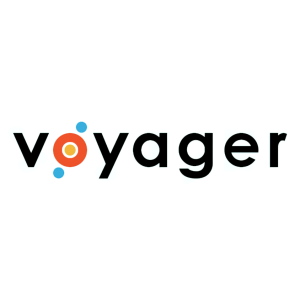Voyager Therapeutics Reports Second Quarter 2024 Financial and Operating Results
Rhea-AI Summary
Voyager Therapeutics (Nasdaq: VYGR) reported its Q2 2024 financial results and operational progress. Key highlights include:
1. Initiated Phase 1a single ascending dose trial of anti-tau antibody VY7523 for Alzheimer's disease, with top-line data expected in H1 2025.
2. Advanced three CNS gene therapy programs towards INDs in 2025.
3. Appointed Nathan Jorgensen, Ph.D., as CFO.
4. Strong cash position of $371 million as of June 30, 2024, providing runway into 2027.
5. Q2 2024 collaboration revenue increased to $29.6 million, up from $4.9 million in Q2 2023.
6. Net loss decreased to $10.1 million in Q2 2024, compared to $22.2 million in Q2 2023.
7. R&D expenses increased to $34.5 million in Q2 2024, up from $22.0 million in Q2 2023.
Positive
- Initiated Phase 1a trial for VY7523 anti-tau antibody in Alzheimer's disease
- Three CNS gene therapy programs on track for INDs in 2025
- Strong cash position of $371 million, providing runway into 2027
- Collaboration revenue increased to $29.6 million in Q2 2024, up from $4.9 million in Q2 2023
- Net loss decreased to $10.1 million in Q2 2024, down from $22.2 million in Q2 2023
- Received milestone payments from Neurocrine Biosciences collaboration
Negative
- R&D expenses increased to $34.5 million in Q2 2024, up from $22.0 million in Q2 2023
- G&A expenses increased to $10.2 million in Q2 2024, up from $8.3 million in Q2 2023
- Net loss of $21.5 million for the first half of 2024, compared to net income of $101.8 million in the same period of 2023
News Market Reaction
On the day this news was published, VYGR declined 14.04%, reflecting a significant negative market reaction.
Data tracked by StockTitan Argus on the day of publication.
- Top-line safety and pharmacokinetic data expected in H1 2025 from recently initiated single ascending dose trial of anti-tau antibody for Alzheimer’s disease -
- Three CNS gene therapy programs on track for INDs in 2025 following development candidate nominations for GBA1 and FA programs and pre-IND meeting for SOD1 ALS development candidate -
- Appointed strategic financial leader Nathan Jorgensen, Ph.D., as Chief Financial Officer -
- Strong cash position of
LEXINGTON, Mass., Aug. 06, 2024 (GLOBE NEWSWIRE) -- Voyager Therapeutics, Inc. (Nasdaq: VYGR), a biotechnology company dedicated to advancing neurogenetic medicines, today reported second quarter 2024 financial and operating results.
“Voyager continued to progress our pipeline in the second quarter: we initiated the single ascending dose trial of our anti-tau antibody, which has been shown to substantially reduce the spread of tau in Alzheimer’s disease in vivo models, and enrollment is on track with top-line safety and pharmacokinetic data expected in H1 2025,” said Alfred W. Sandrock, Jr., M.D., Ph.D., Chief Executive Officer of Voyager. “In parallel, we continued to advance our gene therapy pipeline, and we and our partners are on track to achieve three IND filings in 2025. Our disciplined execution, backed by a strong cash position, should enable us to achieve multiple data readouts during 2025 and 2026.”
Second Quarter 2024 and Recent Highlights
- Dosed first participants in Phase 1a single ascending dose (SAD) trial of anti-tau antibody VY7523 (formerly VY-TAU01) for Alzheimer’s disease: This randomized, double-blind, placebo-controlled, SAD trial is evaluating the safety and pharmacokinetics of VY7523 in healthy adult volunteers. Enrollment is on track, with a total of approximately 48 patients expected to enroll across multiple cohorts.
- Advanced VY9323 gene therapy program for SOD1 amyotrophic lateral sclerosis (ALS): Completed pre-investigational new drug (IND) meeting with the U.S. Food and Drug Administration (FDA) and initiated Good Laboratory Practice (GLP) toxicology studies to support IND filing.
- Selected development candidate in GBA1 gene therapy program: The joint steering committee with collaborator Neurocrine Biosciences selected a lead development candidate for the GBA1 gene therapy program for the treatment of Parkinson’s disease and other GBA1-mediated diseases, triggering a
$3 million milestone payment to Voyager. This followed the selection of a lead development candidate for the Neurocrine-partnered Friedreich’s ataxia (FA) gene therapy program in the first quarter, which resulted in a$5 million milestone payment to Voyager. - Appointed Nathan Jorgensen, Ph.D., as Chief Financial Officer: Dr. Jorgensen brings to Voyager a breadth of experience spanning investment banking, public and private healthcare investing, sell-side research, and operational roles in biotech, as well as expertise in neuroscience.
- Presented data at the American Society of Gene & Cell Therapy (ASGCT) 27th annual meeting: Presented a broad set of translational data, including new data on second-generation TRACER™-derived AAV capsids; translatability as evidenced by cross-species and receptor data; and activity against therapeutic targets in Alzheimer’s disease and ALS.
Anticipated Upcoming Milestones
- VY7523 anti-tau antibody for Alzheimer’s disease: Voyager expects top-line safety and pharmacokinetic data from the ongoing SAD trial in H1 2025. Voyager expects to initiate a multiple ascending dose (MAD) trial in patients with early Alzheimer’s disease in 2025. The MAD study has the potential to generate initial tau PET imaging data in the second half of 2026 to demonstrate slowing the spread of pathological tau.
- VY9323 SOD1 silencing gene therapy program for SOD1 ALS: Voyager expects to file an IND in mid-2025 and initiate a clinical trial in SOD1 ALS patients. The clinical trial has the potential to generate proof-of-concept data for Voyager’s novel TRACER-derived capsids and for the treatment of SOD1 ALS based on biomarkers, including cerebrospinal fluid (CSF) SOD1 and plasma neurofilament.
- Partnered programs: Voyager and Neurocrine Biosciences expect to file INDs for the GBA1 and Friedreich’s Ataxia gene therapy programs in 2025, as previously disclosed.
Second Quarter 2024 Financial Results
- Collaboration Revenues: Voyager had collaboration revenue of
$29.6 million for the second quarter of 2024, compared to$4.9 million for the same period in 2023. The increase was primarily due to increased revenue recognized under our Neurocrine and Novartis agreements. - Net Loss: Net loss was
$10.1 million for the second quarter of 2024, compared to net loss of$22.2 million for the same period in 2023. The decrease is primarily due to increased collaboration revenue recognized during the second quarter of 2024, as discussed above. - R&D Expenses: Research and development expenses were
$34.5 million for the second quarter of 2024, compared to$22.0 million for the same period in 2023. The increase in R&D expenses was primarily a result of increased facilities costs, which includes a$2.5 million non-recurring lease impairment charge and$0.5 million in non-recurring relocation expenses, along with increased program-related spending and increased headcount. - G&A Expenses: General and administrative expenses were
$10.2 million for the second quarter of 2024, compared to$8.3 million for the same period in 2023. The increase in G&A expenses was primarily a result of$1.3 million in non-recurring items including lease impairment charge and personnel transition costs. - Cash Position: Cash, cash equivalents and marketable securities as of June 30, 2024, were
$371.0 million .
Six Months Ended June 30, 2024, Financial Results
- Collaboration Revenues: Voyager had collaboration revenue of
$49.1 million for the six months ended June 30, 2024, compared to$155.3 million for the same period in 2023. The decrease was primarily due to decreased revenue recognized under our Neurocrine and Novartis agreements. - Net (Loss) Income: Net loss was
$21.5 million for the six months ended June 30, 2024, compared to net income of$101.8 million for the same period in 2023. The change is primarily due to decreased collaboration revenue recognized during the 2024 period, as discussed above. - R&D Expenses: Research and development expenses were
$61.5 million for the six months ended June 30, 2024, compared to$40.6 million for the same period in 2023. The increase in R&D expenses was primarily a result of increased facilities costs, which includes a$2.5 million non-recurring lease impairment charge and$0.5 million in non-recurring relocation expenses, along with increased program-related spending and increased headcount. - G&A Expenses: General and administrative expenses were
$18.8 million for the six months ended June 30, 2024, compared to$17.3 million for the same period in 2023. The increase in G&A expenses was primarily a result of$1.3 million in non-recurring items including lease impairment charge and personnel transition costs.
Financial Guidance
Voyager is committed to maintaining a strong balance sheet that supports the advancement and growth of its platform and pipeline. Voyager continues to assess its planned cash needs both during the current period and in future periods. We expect our cash, cash equivalents, and marketable securities, along with amounts expected to be received as reimbursement for development costs under the Neurocrine and Novartis collaborations and interest income, to be sufficient to meet Voyager’s planned operating expenses and capital expenditure requirements into 2027.
Conference Call
Voyager will host a conference call and webcast today at 4:30 p.m. ET to discuss second quarter 2024 financial and operating results. To participate via telephone and join the call live, please register in advance here: https://register.vevent.com/register/BI796eccb31a2e48c9a71f6c41edd5c510. Upon registration, telephone participants will receive a confirmation email detailing how to join the conference call, including the dial-in number and a unique passcode. A live webcast of the call will also be available on the Investors section of the Voyager website at ir.voyagertherapeutics.com, and a replay of the call will be available at the same link approximately two hours after its completion. The replay will be available for at least 30 days following the conclusion of the call.
About Voyager Therapeutics
Voyager Therapeutics, Inc. (Nasdaq: VYGR) is a biotechnology company dedicated to leveraging the power of human genetics to modify the course of – and ultimately cure – neurological diseases. Our pipeline includes programs for Alzheimer’s disease, amyotrophic lateral sclerosis (ALS), Parkinson’s disease, and multiple other diseases of the central nervous system. Many of our programs are derived from our TRACER™ AAV capsid discovery platform, which we have used to generate novel capsids and identify associated receptors to potentially enable high brain penetration with genetic medicines following intravenous dosing. Some of our programs are wholly owned, and some are advancing with partners including Alexion, AstraZeneca Rare Disease; Novartis Pharma AG; Neurocrine Biosciences, Inc.; and Sangamo Therapeutics, Inc. For more information, visit www.voyagertherapeutics.com.
Voyager Therapeutics® is a registered trademark, and TRACER™ is a trademark, of Voyager Therapeutics, Inc.
Forward-Looking Statements
This press release contains forward-looking statements for the purposes of the safe harbor provisions under The Private Securities Litigation Reform Act of 1995 and other federal securities laws. The use of words such as “expect,” “enable,” “will,” “believe,” “anticipate,” “potential,” “may,” or “continue,” and other similar expressions are intended to identify forward-looking statements.
For example, all statements Voyager makes regarding Voyager’s ability to advance its AAV-based gene therapy programs and tau antibody program, including expectations for Voyager’s achievement of preclinical and clinical development milestones for its potential development candidates such as IND filings, the initiation of clinical trials, clinical trial enrollment, and generation of clinical data and proof-of-concept; Voyager’s ability to advance gene therapy product candidates under the Neurocrine collaboration; Voyager’s anticipated financial results, including the anticipated receipt by Voyager of revenues or reimbursement payments from collaboration partners; and Voyager’s cash runway and ability to generate sufficient cash resources to enable it to continue its business and operations are forward looking.
All forward-looking statements are based on estimates and assumptions by Voyager’s management that, although Voyager believes such forward-looking statements to be reasonable, are inherently uncertain. All forward-looking statements are subject to risks and uncertainties that may cause actual results to differ materially from those that Voyager expected. Such risks and uncertainties include, among others, the expectations and decisions of regulatory authorities; the timing, initiation, conduct and outcomes of Voyager’s preclinical and clinical studies; the availability of data from clinical trials; the availability or commercial potential of product candidates under collaborations; the willingness and ability of Voyager's collaboration partners to meet obligations under collaboration agreements with Voyager; the continued development of Voyager’s technology platforms, including Voyager’s TRACER platform and its antibody screening technology; Voyager’s scientific approach and program development progress, and the restricted supply of critical research components; the development by third parties of capsid identification platforms that may be competitive to Voyager’s TRACER capsid discovery platform; Voyager’s ability to create and protect intellectual property rights associated with the TRACER capsid discovery platform, the capsids identified by the platform, and development candidates for Voyager’s pipeline programs; the possibility or the timing of Voyager’s receipt of program reimbursement, development or commercialization milestones, option exercise, and other payments under Voyager’s existing licensing or collaboration agreements; the ability of Voyager to negotiate and complete licensing or collaboration agreements with other parties on terms acceptable to Voyager and the third parties; the success of programs controlled by third party collaboration partners in which Voyager retains a financial interest, and the success of Voyager’s product candidates; the ability to attract and retain talented directors, employees, and contractors; and the sufficiency of cash resources to fund its operations and pursue its corporate objectives.
These statements are also subject to a number of material risks and uncertainties that are described in Voyager’s most recent Annual Report on Form 10-K filed with the Securities and Exchange Commission. All information in the press release is as of the date of this press release, and any forward-looking statement speaks only as of the date on which it was made. Voyager undertakes no obligation to publicly update or revise this information or any forward-looking statement, whether as a result of new information, future events or otherwise, except as required by law.
Contacts
Trista Morrison, NACD.DC, tmorrison@vygr.com
Investors: Adam Bero, Ph.D., abero@kendallir.com
Media: Brooke Shenkin, brooke@scientpr.com
| Selected Financial Information ($ amounts in thousands, except per share data) (Unaudited) | ||||||||||||||||
| Three Months Ended | Six Months Ended | |||||||||||||||
| June 30, | June 30, | |||||||||||||||
| Statement of Operations Items: | 2024 | 2023 | 2024 | 2023 | ||||||||||||
| Collaboration revenue | $ | 29,578 | $ | 4,853 | $ | 49,094 | $ | 155,333 | ||||||||
| Operating expenses: | ||||||||||||||||
| Research and development | 34,452 | 21,985 | 61,544 | 40,553 | ||||||||||||
| General and administrative | 10,151 | 8,294 | 18,758 | 17,322 | ||||||||||||
| Total operating expenses | 44,603 | 30,279 | 80,302 | 57,875 | ||||||||||||
| Operating (loss) income | (15,025 | ) | (25,426 | ) | (31,208 | ) | 97,458 | |||||||||
| Total other income | 4,908 | 3,277 | 9,775 | 5,141 | ||||||||||||
| (Loss) income before income taxes | (10,117 | ) | (22,149 | ) | (21,433 | ) | 102,599 | |||||||||
| Income tax provision | 24 | 59 | 38 | 763 | ||||||||||||
| Net (loss) income | $ | (10,141 | ) | $ | (22,208 | ) | $ | (21,471 | ) | $ | 101,836 | |||||
| Net (loss) income per share, basic | $ | (0.18 | ) | $ | (0.51 | ) | $ | (0.37 | ) | $ | 2.42 | |||||
| Net (loss) income per share, diluted | $ | (0.18 | ) | $ | (0.51 | ) | $ | (0.37 | ) | $ | 2.33 | |||||
| Weighted-average common shares outstanding, basic | 57,721,934 | 43,520,137 | 57,419,490 | 42,102,101 | ||||||||||||
| Weighted-average common shares outstanding, diluted | 57,721,934 | 43,520,137 | 57,419,490 | 43,770,999 | ||||||||||||
| June 30, | December 31, | ||||||
| Selected Balance Sheet Items | 2024 | 2023 | |||||
| Cash, cash equivalents, and marketable securities | $ | 371,021 | $ | 230,875 | |||
| Total assets | $ | 436,225 | $ | 351,281 | |||
| Accounts payable and accrued expenses | $ | 12,878 | $ | 18,427 | |||
| Deferred revenue | $ | 39,989 | $ | 75,240 | |||
| Total stockholders’ equity | $ | 335,417 | $ | 236,320 | |||
GAAP vs. Non-GAAP Financial Measures
Voyager’s financial statements are prepared in accordance with generally accepted accounting principles in the United States, or GAAP, and represent revenue and expenses as reported to the Securities and Exchange Commission. Voyager has provided in this release certain financial information that has not been prepared in accordance with GAAP, including net collaboration revenue and net research and development expenses, which exclude the impact of reimbursement by Neurocrine Biosciences (Neurocrine) and Novartis Pharma AG (Novartis) for expenses we incur in conducting preclinical development activities under our collaboration agreements. Management uses these non-GAAP measures to evaluate the Company’s operating performance in a manner that allows for meaningful period-to-period comparison and analysis of trends in its business. Management believes that such non-GAAP measures are important in comparing current results with prior period results and are useful to investors and financial analysts in assessing the Company’s operating performance. Non-GAAP financial measures are not required to be uniformly applied, are not audited and should not be considered in isolation. The non-GAAP measures give investors and financial analysts a better understanding of our net revenue and net research and development expenses without the pass-through impact of Neurocrine costs. The non-GAAP financial information presented here should be considered in conjunction with, and not as a substitute for, the financial information presented in accordance with GAAP. Investors are encouraged to review the reconciliation of these non-GAAP measures to their most directly comparable GAAP financial measures set forth below.
| Reconciliation of GAAP to Non-GAAP Measures | ||||||||||||
| (in thousands) | ||||||||||||
| Three Months Ended | Six Months Ended | |||||||||||
| June 30, | June 30, | |||||||||||
| 2024 | 2023 | 2024 | 2023 | |||||||||
| GAAP collaboration revenue | $ | 29,578 | $ | 4,853 | $ | 49,094 | $ | 155,333 | ||||
| Revenue recognized for reimbursed research and development services (Note 1) | $ | 1,963 | $ | 3,050 | $ | 5,148 | $ | 3,378 | ||||
| Net collaboration revenue | $ | 27,615 | $ | 1,803 | $ | 43,946 | $ | 151,955 | ||||
| GAAP total research and development expenses | $ | 34,452 | $ | 21,985 | $ | 61,544 | $ | 40,553 | ||||
| Expenses incurred for reimbursed research and development services (Note 1) | $ | 1,963 | $ | 3,050 | $ | 5,148 | $ | 3,378 | ||||
| Net research and development expenses | $ | 32,489 | $ | 18,935 | $ | 56,396 | $ | 37,175 | ||||
Note 1: Under the Company's existing collaboration agreements with Neurocrine and Novartis, Neurocrine and Novartis have agreed to be responsible for all costs the Company incurs in conducting preclinical development activities for certain collaboration programs, in accordance with joint steering committee agreed upon workplans and budgets. Reimbursable research and development services performed during the period are captured within collaboration revenue and research and development expenses in the Company's consolidated statements of operations. During the three months ended June 30, 2024, we incurred








